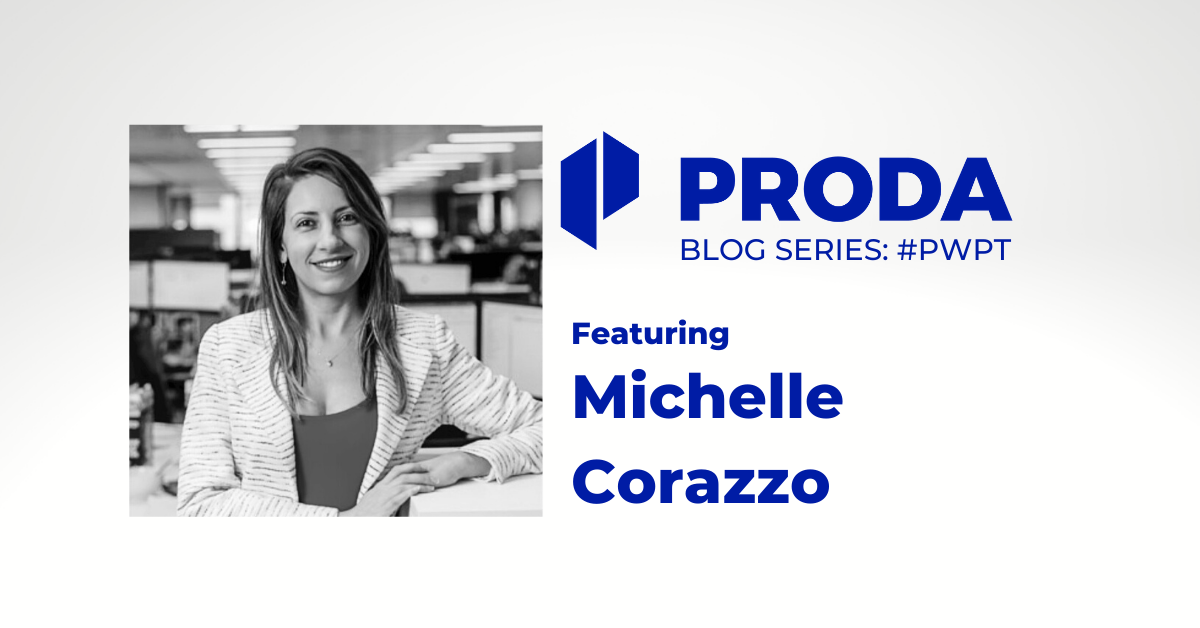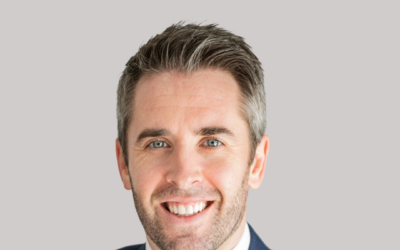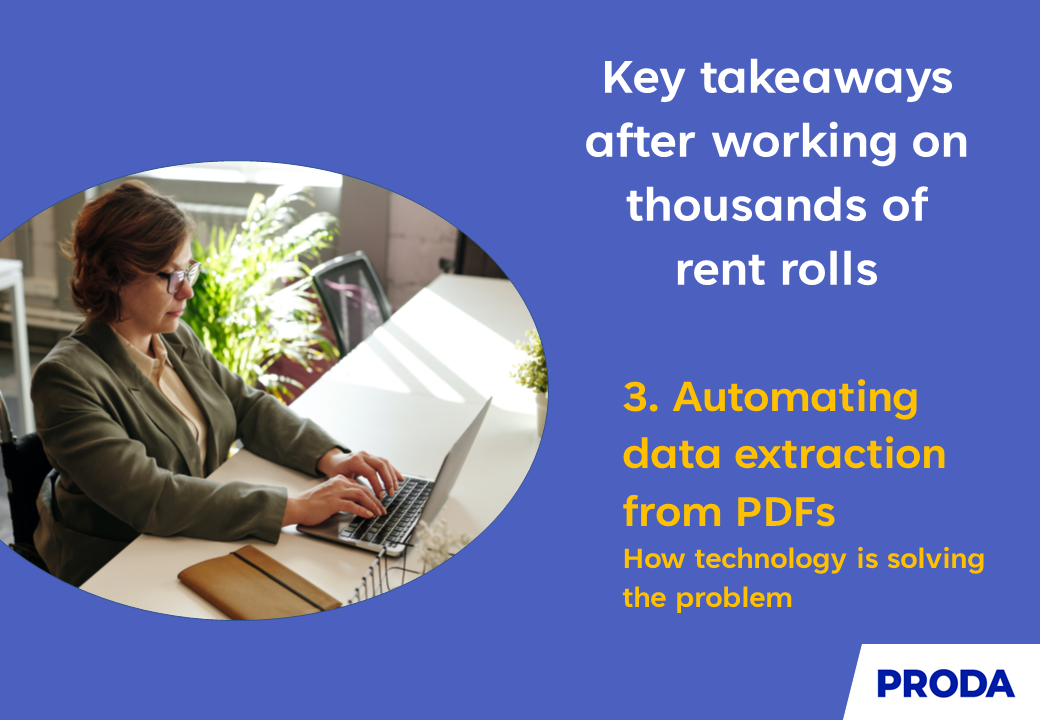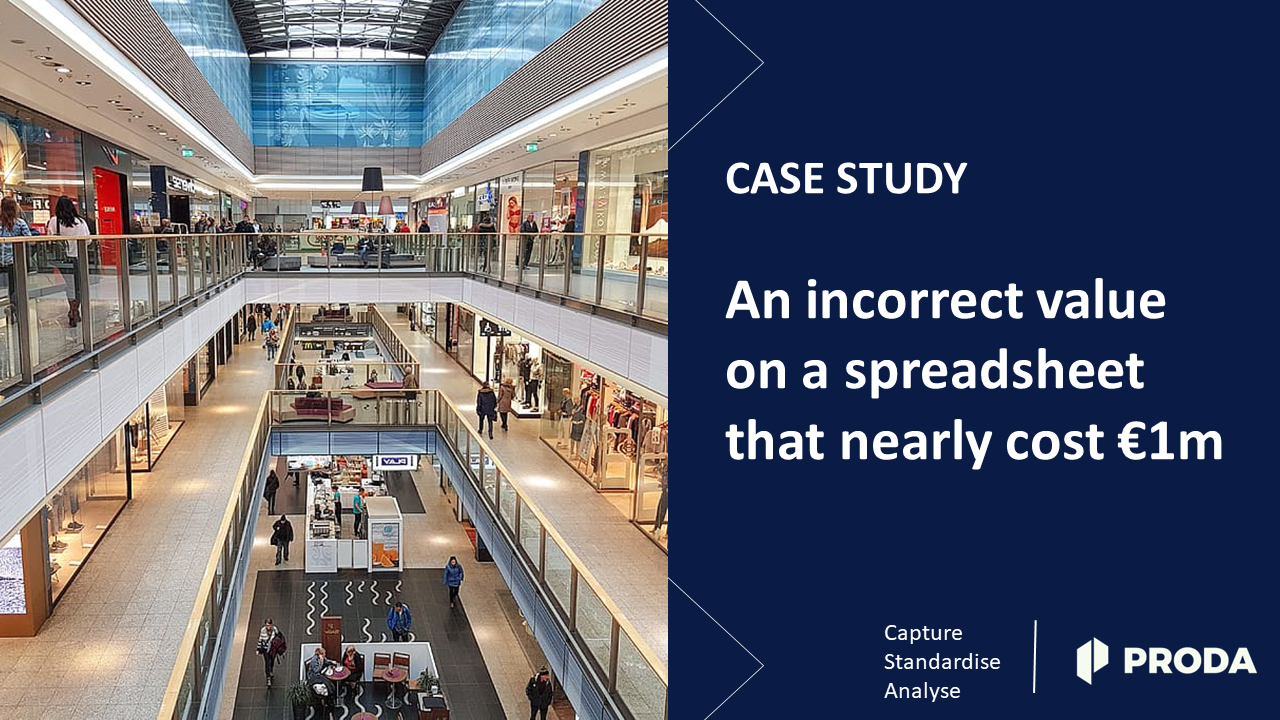– A Blog Series By Proda
This week, we are very excited to feature Michelle Corazzo in our blog series: PRODA’s Powerful Women of PropTech (#PWPT). Michelle is Director at haysmacintyre with experience that spans across a wide range of industries, so we caught up with her to learn about her take on women in the PropTech sector.
We are back this week with another post for our current blog series: PRODA’s Powerful Women of PropTech, and this week we are very excited to feature Michelle Corazzo – Director at haysmacintyre. If you have missed any previous blog posts from the series, be sure to catch up on them, here.
haysmacintyre are an award winning firm of chartered accountants and tax advisors, with 36 partners and over 300 staff, who focus on providing advice to entrepreneurs, fast-growing and owner-managed businesses. Having been with the firm for close to five years, Michelle now specialises in tech and property. We spoke to Michelle about her extensive experience in a range of sectors over the years, and how this compares to the property and tech sectors, along with much more!
Read the full interview below.
MV: Can you tell us a little bit about your professional journey, from beginning your career at Baker Tilly, to now being Director at Haysmacintyre?
MC: So, I began my career in Corporation Tax at Baker Tilly, which is a top 10 accountancy firm, straight after university. Whilst I was there, I studied and qualified as a member of The Association of Taxation Technicians and as a Chartered Accountant with the Institute of Chartered Accountants of Scotland.
I progressed fairly quickly to Corporate Tax Manager and was identified early on for their corporate leadership programme, aimed at developing high potential individuals within the firm. After 7 years, I decided to take the plunge and ventured out of my comfort zone to join haysmacintyre, where I have progressed to Director. Here, I sit within the firm’s Corporate leadership team to devise business and sector strategy.
MV: What does a ‘typical’ day look like for you, as Director?
MC: I don’t seem to have a typical day as such because often my days vary so much from one to another, but that is what I love about my job, as they say, ‘variety is the spice of life!’ I guess a sample day would include meeting a client to discuss their tax affairs, some blue sky thinking and discussing business strategy, as well as looking for any tax planning opportunities.
Quite often, I will have a couple of internal meetings, for example a team meeting where we will discuss workflow or a planning meeting to discuss upcoming work on a client. I am always appearing at networking events, and my preference is to attend these in the evening as opposed to the morning, as I’m not the biggest morning person!
My days seem to go at 100mph most of the time, but I do always make time for the essentials like making cups of tea, as well as for snacking on office treats and of course the important office banter with my colleagues. That’s definitely one thing that many of us are struggling with during this time – the lack of social interaction from our normal office environments, and I’m looking forward to getting back to that!
“…senior roles tend to be filled, in the majority of cases, by males rather than females and I think more needs to be done to encourage women to study in these areas, if they wish to do so. A good example of this can be seen with Engineering, where more and more females are entering into this field and an increasing number of organisations are also doing their part to encourage more women in to the industry, which is great to see.”
MV: With the focus of your role being in large multinational groups and growing SME’s, have you, yourself noticed a dearth of females in senior roles? If so, why do you believe this is?
MC: As a tax advisor, I deal primarily with Finance Directors, Heads of Finance and CEO’s. Since starting my career, I have been very fortunate in the fact that the portfolios of companies and groups that I have dealt with has been so wide-ranging, in terms of sector and industry.
I have had exposure to many types of organisations, ranging from high profile fashion clients, tech companies, Premiership football clubs, hotel and property groups, to marketing agencies and so many more. As I have progressed in my career, I have been able to specialise in tech and property as they are two sectors that really interest me. What I would say is that given the wide range of clients that I have dealt with during my career, there has been a fair mix of females and males in senior roles but depending on the sector this may lean itself more towards one gender, compared to the other.
One observation is that at university I started studying Linguistics, and there was a considerable number of females on this course, however, later on, I switched courses to Business Management with Economics and the number of females in my class dropped significantly, to where it was less than 10%. Therefore, the nature of the industry and sector definitely does play a part.
Specifically, when speaking about technology, my experience is that senior roles tend to be filled, in the majority of cases, by males rather than females and I think more needs to be done to encourage women to study in these areas, if they wish to do so. A good example of this can be seen with Engineering, where more and more females are entering into this field and an increasing number of organisations are also doing their part to encourage more women in to the industry, which is great to see.
MV: Do you feel any pressure as a female leader, particularly where there is such a small number of females in similar senior positions?
MC: I don’t feel any pressure when dealing with my own clients. I’ve always been very well respected as a tax advisor and my ability to help with tax planning has been appreciated by both males and females in senior roles. As I have progressed to specialise in property and tech, an integral part of my role as a Director includes business development and being a key driver of the firm’s business. This includes, going to several networking events, and there was one occasion where I was the only female in the room.
I remember one instance where a female partner of a law firm expressed that she felt apprehensive about going to some of these events because they can be typically male dominated. That’s coming from a female in a very senior position, and I think that demonstrates that women can feel a certain amount of pressure in these kind of environments in one way or another.
MV: What is the biggest challenge that you have faced, if any, as a female in the industry?
MC: The accountancy world, in itself, is predominantly male dominated, and that’s the career that I chose to go in to, so in terms of challenges I think building confidence is certainly key, and I think in any career if you want to climb you have to have that confidence in yourself and be willing to go outside of your comfort zone without setting yourself any limitations.
“For its own survival and ability to adapt to the new way of working and living, the real estate sector, both residential and commercial, needs to innovate and adopt more technology, but I think we will see players in the market becoming more cost conscious, which will define the technology that they invest in and adopt…”
MV: The power of PropTech/real estate is undeniable, and the industry is considered one of the fastest growing in the world, when the world overcomes the current uncertainties, we are all facing together, what do you believe the future will look like?
MC: With everything that has happened recently, I think it will definitely accelerate who the winners and losers are going to be in the PropTech space, and once we overcome the current uncertainties, we will have more clarity on who those are. The reason I say this is that whilst Covid has acted as a catalyst for digital transformation, which opens up more opportunity for PropTech, it also brings a huge amount of challenges. Many companies in the PropTech industry take the form of an early stage start-up, that simply may not be able to survive the current climate and as we enter into a recession, raising investment is likely to become much more difficult than usual.
For its own survival and ability to adapt to the new way of working and living, the real estate sector, both residential and commercial, needs to innovate and adopt more technology, but I think we will see players in the market becoming more cost conscious, which will define the technology that they invest in and adopt, with a focus on the ‘must haves’ as opposed to the ‘nice-to-haves’.
As we emerge from the crisis, there will be certain technologies that will thrive thus attracting the capital in the market, but there will also be those that will no longer be as relevant, and demand will drop. Some PropTechs may also pop up during this time, to address certain needs that have arisen, post Covid.
MV: What excites you the most when you think of the new future that we are heading towards?
MC: The past few months have proved for many of us, that not only can we work remotely, but we can do so just as efficiently and effectively as working in an office. Going forward, the commercial office space is going to look very different and employers will look for ways to entice their employees back to the office environment and I believe technology will have a key part to play in that, so we may see employees having access to technology in the office which they can’t necessarily get at home.
Also, with digital revolution underway, people’s mindsets are changing, viewing property as a service as opposed to a fixed asset, changing the way we live, the way we work. PropTech will become even more important for communication, engagement and the provision of services.
As we work towards what the new future will look like, I think we would all like to see more of a focus on sustainability, health and well-being and the rise of PropTech provides a way for us to do this.
“My advice is simple: Be yourself and be confident. Don’t be afraid to reach for the top and try to find yourself a mentor who can help you to develop and progress in your career.”
MV: Finally, what advice would you give to any young women or women in general who may be considering a career in a senior position, like director, but feel there may be a barrier due to preconceived notions regarding gender?
MC: My advice is simple: Be yourself and be confident. Don’t be afraid to reach for the top and try to find yourself a mentor who can help you to develop and progress in your career. Also identifying a role model you can aspire to be in your chosen industry works wonders for determination to succeed!
***
Written by Manisha Veja, Featuring Michelle Corazzo.
A special thank you to Michelle for taking part in our blog series. If you are interested in featuring in the series please email mveja@proda.ai.
We will be back next week with another addition to our blog series, as we continue to interview the inspiring women both internally at PRODA, as well as externally. In the meantime, for the latest news and updates follow us on Twitter and Linked In.




